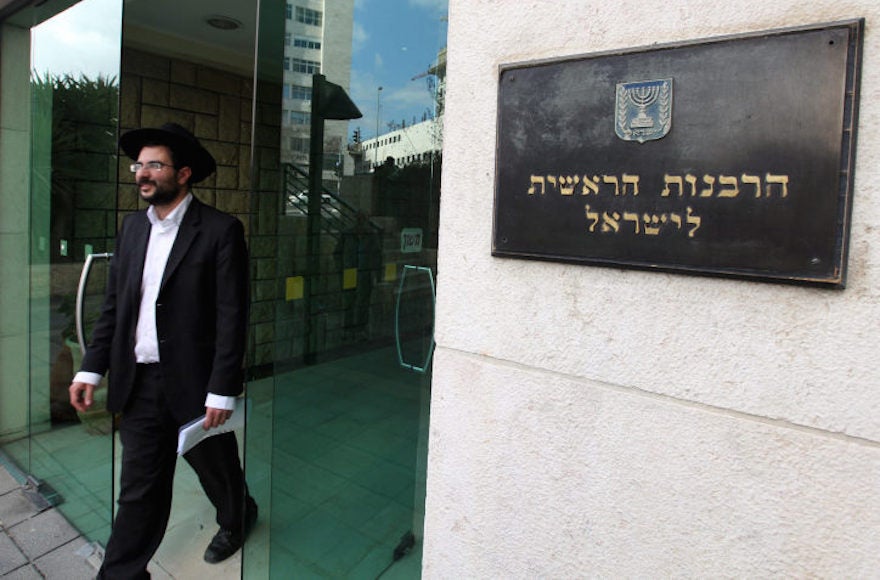(JTA) — Jewish converts in America may have a much harder time being accepted in Israel because of a new set of regulations proposed by Israel’s Chief Rabbinate.
If adopted, some activists in Israel say, the new guidelines for religious courts could drive a deeper wedge between Israel and Diaspora Jewry.
The Chief Rabbinate, which controls Jewish marriage, divorce, conversion and burial in the Jewish state, is largely run by haredi Orthodox leaders. For years it has clashed with rabbis in America — even Orthodox ones — who have more liberal interpretations of Jewish law.
The Chief Rabbinate does not consider non-Orthodox Judaism to be valid, so it does not accept the authority of Conservative and Reform rabbis. And in recent years, it has had a series of public disputes with Orthodox rabbis whose authority it rejects.
This week, hoping to clarify exactly which Orthodox rabbis meet its standards, the Chief Rabbinate published a list of draft criteria for religious courts in the Diaspora. If a religious court meets the criteria, the Jewish conversions it conducts will be recognized by the Chief Rabbinate. If not, the Chief Rabbinate will not consider its converts Jewish.
The same goes for Jewish ritual divorces: The Chief Rabbinate will accept them only if they are performed by a qualified religious court.
This matters for non-Israeli converts and divorcees if they ever want their religious or marital status recognized in Israel. Those who convert in America under an unrecognized religious court, for example, would not be able to marry in Israel because the Chief Rabbinate controls Jewish marriage there. Likewise, divorced individuals would not be able to remarry in Israel if their Jewish divorce is not recognized. If a female divorcee’s Jewish divorce is not recognized, her children from a subsequent marriage would be forbidden by the Chief Rabbinate from marrying most Jews.
The document’s language is in the past tense, which means it could apply retroactively — rejecting the status of Jewish converts who formerly were accepted in Israel. In other words, a convert accepted by the Chief Rabbinate this year could be rejected next year.
The criteria demand that the courts be permanent and operate year-round. Their rabbis must demonstrate fealty to Orthodox Jewish law and be endorsed by a major Orthodox organization.
This means non-Orthodox rabbis and rabbinical courts will be rejected. So will graduates of Yeshivat Chovevei Torah, a liberal Orthodox seminary in New York City, because they are not recognized by the Rabbinical Council of America, the major U.S. Orthodox rabbis’ group. Ad hoc religious courts, often set up in small communities for a specific person’s conversion, also will not be approved.
If two courts are serving the same local population of Jews, only one will receive approval. Courts that want to apply for approval must submit their rabbis to an exam on Jewish law administered by the Chief Rabbinate.
The Chief Rabbinate says the criteria are an attempt to set transparent, objective standards. At a Knesset meeting on the proposed criteria this week, Knesset member Uri Maklev of the haredi United Torah Judaism party said that “clarifying what is Judaism is an obligation in [rabbinical] courts and a fundamental principle upon becoming part of the Jewish people.”
In the past, the religious authority has rejected the qualifications of an Orthodox rabbi because it deemed him insufficiently observant of Jewish law. That’s what happened in 2014 when the Chief Rabbinate rejected a conversion affirmed by Rabbi Avi Weiss, the prominent liberal Orthodox rabbi and founder of Chovevei Torah.
But in other cases, the Chief Rabbinate has rejected rabbis’ authority simply due to bureaucratic confusion. In 2015, one of its district courts rejected the authority of Rabbi Haskel Lookstein, a widely respected Modern Orthodox rabbi in New York, even though Israel’s chief rabbi vouched for him.
As of now, one midlevel bureaucrat, Rabbi Itamar Tubul, decides which rabbis and marriages are accepted by the Chief Rabbinate. Last year, JTA obtained a so-called “blacklist” of Diaspora rabbis whose authority the Chief Rabbinate had rejected.
Critics are calling the criteria demeaning and overly strict. Itim, an Israeli nonprofit that works to navigate and challenge the Chief Rabbinate’s bureaucracy, called the list a “power grab.”
“These ‘criteria’ show the Chief Rabbinate’s disdain for world Jewry, blatant attempt at power consolidation, and profoundly un-Jewish approach,” Rabbi Seth Farber, Itim’s founder and director, said in a statement. “Itim will fight this using every legislative and legal tool available.
The Israel Democracy Institute think tank called the document “very problematic.”
“The proposal creates a reality in which the Israeli rabbinate extends its monopoly over Jews’ personal status in areas of marriage and divorce — beyond Israel,” Shuki Friedman, director of the institute’s Center for Religion, Nation and State, said in a statement. “Thus the rift between Israel and Diaspora Jewry could grow, many Jews around the world may feel alienated, and immigration to Israel could decline.”
JTA has documented Jewish history in real-time for over a century. Keep our journalism strong by joining us in supporting independent, award-winning reporting.






